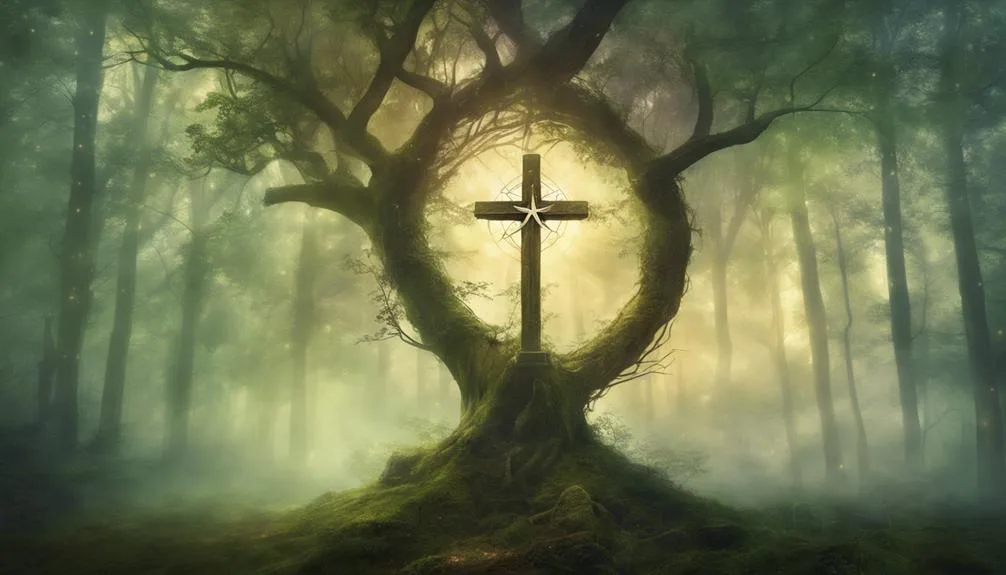Many people wonder if Christians can also practice witchcraft, despite their differences. Christianity and witchcraft have been subjects of debate for a long time, with opinions split on whether they can mix.
Some believe these beliefs can't blend due to Christian teachings, while others manage to merge aspects of both in their spiritual journey. Exploring this topic reveals various viewpoints on how, or if, Christians can find a middle ground between these contrasting beliefs.
Key Takeaways
- Christian witches blend love and healing with magic.
- There are varying Christian views on witchcraft practices.
- The Bible strongly condemns engaging in witchcraft.
- Christians must align magical practices with their faith.
Definition of Witches in Christianity
In Christianity, witches are typically defined as individuals who practice magic or sorcery, often believed to be in connection with evil forces. Throughout history, Christian perspectives on witches have varied, influenced by cultural beliefs, theological interpretations, and societal norms.
In the historical context, the perception of witches has evolved over time, with periods of intense persecution, such as the European witch hunts of the early modern period, where thousands of individuals, primarily women, were accused of witchcraft and faced severe consequences.
Christian perspectives on witches have been shaped by biblical teachings, with references to witchcraft found in passages like Exodus 22:18, which states, 'Thou shalt not suffer a witch to live.' These scriptural interpretations have contributed to the negative connotations associated with witches in many Christian traditions. However, some modern Christian denominations have adopted more nuanced views on witchcraft, emphasizing love, understanding, and the importance of discernment when engaging with practices outside mainstream beliefs.
Views on Christian Witches
Considering the evolving perspectives within Christianity, Christian views on witches have begun to encompass a range of interpretations and understandings. The notion of Christian witches challenges traditional beliefs, as it combines elements of Christianity with practices often associated with witchcraft.
Some Christians who identify as witches believe they can harmoniously blend their religious beliefs with magical practices, viewing witchcraft as a way to connect more deeply with their spirituality. These Christian witches often emphasize love, healing, and positive energy in their craft, aligning it with Christian principles of compassion and kindness.
However, within Christianity, opinions on Christian witches vary widely. Some view it as incompatible with the faith, citing Biblical verses that condemn witchcraft. Others take a more inclusive stance, arguing that individuals should be free to explore spirituality in ways that resonate with them.
Ultimately, the question of whether Christians can be witches remains a complex and debated topic within the Christian community, reflecting the diversity of beliefs present in modern Christianity.
Biblical Perspective on Witchcraft

From a Biblical perspective, witchcraft is often condemned as a practice contrary to Christian teachings. Despite the complexities surrounding the topic, the Bible provides clear warnings against engaging in witchcraft.
- Biblical Warnings: Throughout the Bible, there are explicit warnings against witchcraft and divination. For example, in Deuteronomy 18:10-12, it's stated that these practices are detestable to the Lord.
- Historical Context: In the historical context of the Bible, witchcraft was often associated with paganism and idolatry. The Israelites were repeatedly warned against participating in these practices due to their spiritual dangers.
- Divine Disapproval: The Bible emphasizes that seeking supernatural guidance through witchcraft undermines one's faith in God and His power. The Christian faith is based on trust in God alone, and turning to witchcraft contradicts this fundamental belief.
Understanding the biblical warnings and historical context can provide insight into why witchcraft is viewed negatively from a Christian perspective.
Can Christians Practice Witchcraft?
To understand whether Christians can practice witchcraft, you must consider the theological implications and Biblical teachings. Christian beliefs generally discourage engaging in magical practices due to the scriptural warnings against witchcraft and divination. The Bible, particularly in passages like Deuteronomy 18:10-12, explicitly condemns sorcery and witchcraft as detestable practices in the eyes of God.
As a Christian, your faith is rooted in a belief in God's sovereignty and the power of prayer. Engaging in witchcraft, which often involves seeking supernatural power from sources other than God, can contradict these fundamental beliefs. The act of practicing witchcraft may lead to a conflict of interest between your Christian faith and the magical practices associated with witchcraft.
While some individuals may argue that certain forms of magic are harmless and separate from witchcraft, navigating these distinctions can be complex for a practicing Christian. It's essential to prayerfully consider how magical practices align with your Christian beliefs and the teachings of the Bible before engaging in any form of witchcraft.
Conclusion: Compatibility of Christianity and Witchcraft

You can explore the compatibility of Christianity and witchcraft by examining their core beliefs and practices. When considering the intersection of these two seemingly contrasting paths, it's essential to reflect on how they can coexist harmoniously in your spiritual journey.
- Spiritual Journey: Both Christianity and witchcraft offer individuals a way to connect with their spirituality on a personal level. Exploring how these practices complement each other can enhance your overall spiritual growth.
- Personal Beliefs: Understanding that your personal beliefs can evolve and encompass elements from both Christianity and witchcraft can lead to a more enriched and fulfilling spiritual experience.
- Religious Boundaries, Cultural Acceptance: Recognizing and respecting the religious boundaries within Christianity while seeking cultural acceptance for incorporating witchcraft practices can help you navigate this complex relationship.
Conclusion
Ultimately, the intersection of Christianity and witchcraft is a deeply personal matter, hinging on individual interpretations and beliefs. The fusion of these paths suggests that, for some, spirituality isn't confined to traditional boundaries but is instead a more fluid and inclusive concept.
By aligning witchcraft practices with Christian values, individuals can navigate both identities harmoniously. This raises intriguing questions about the nature of faith and spirituality, challenging us to consider the vast spectrum of belief systems and the possibility of their coexistence.

